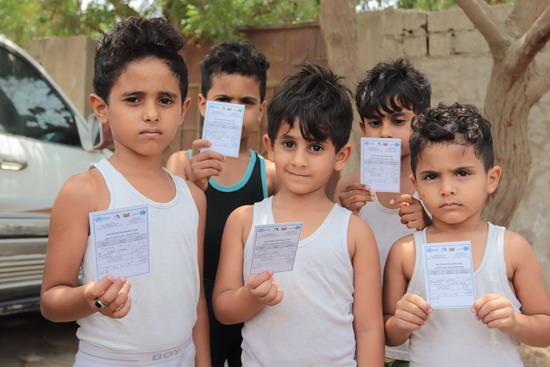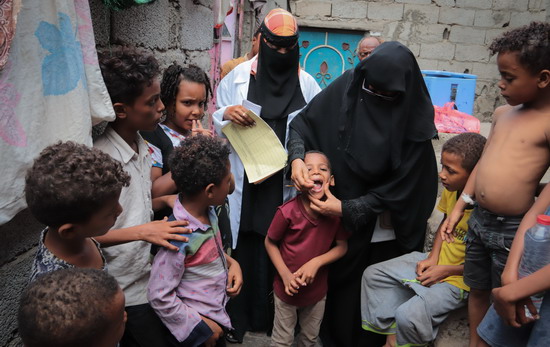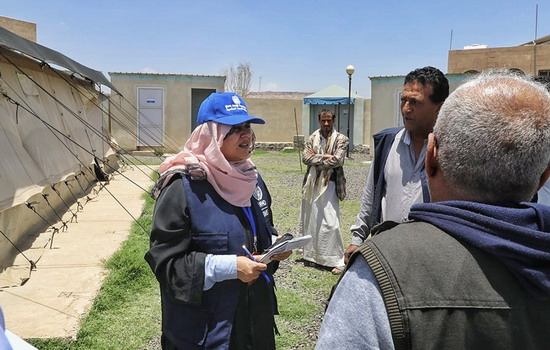Second round of oral cholera vaccine reaches nearly 400 000 people in Aden, Taiz and Al Dhale’e
 Sana’a, 21 August 2019 — A 6-day oral cholera vaccination campaign reached almost 400 000 people, including almost 65 000 children under the age of 5 in Aden, Al Dhale’e and Taiz, where high numbers of suspected cholera and acute watery diarrhoea cases have been recorded.
Sana’a, 21 August 2019 — A 6-day oral cholera vaccination campaign reached almost 400 000 people, including almost 65 000 children under the age of 5 in Aden, Al Dhale’e and Taiz, where high numbers of suspected cholera and acute watery diarrhoea cases have been recorded.
The first few months of 2019 saw an increase of reported acute watery diarrhoea cases in over 95% of districts across Yemen. Between January and the end of July 2019, there have been nearly 536 000 suspected cases and 773 associated deaths. Children under 5 represent one quarter of all suspected cases.
The vaccination campaign, run by local health authorities, UNICEF and WHO, was made possible thanks to GAVI, the Vaccine Alliance, and to the World Bank’s ‘Emergency Health and Nutrition Project.’
“Amid the fighting in surrounding areas, over 800 health workers, brave men and women, risked their lives to reach communities from cholera — these are the real heroes,” said Altaf Musani, WHO Representative in Yemen.
 “Thanks to the extraordinary commitment and dedication of Yemen’s local health workforce, hundreds of thousands of people from these priority districts were reached with vaccination against cholera,” said Sara Beysolow Nyanti, UNICEF Country Representative in Yemen.
“Thanks to the extraordinary commitment and dedication of Yemen’s local health workforce, hundreds of thousands of people from these priority districts were reached with vaccination against cholera,” said Sara Beysolow Nyanti, UNICEF Country Representative in Yemen.
Since April 2017, the cholera and acute watery diarrhoea epidemic in Yemen has caused an estimated 2 million suspected cases and 3500 associated deaths. Almost one third have been in children under 5, including 711 associated deaths. The outbreak in Yemen remains the largest cholera in the world.
Health partners throughout Yemen joined forces to control and prevent any future cholera outbreaks. UNICEF and WHO are working closely with the relevant health authorities and other humanitarian partners to respond.
Related links
#womenhumanitarians: celebrating World Humanitarian Day in Yemen
Laura Lloyd Braff
 I have been involved in emergency response work for the WHO since 2013, and have been stationed in Yemen since 2017. In Yemen, I work as a Project Management Officer on the Emergency Health and Nutrition Project (EHNP), which, in partnership with the World Bank and UNICEF, supports the provision of Health and Nutrition Services in health facilities, while simultaneously protecting the health system in Yemen from collapse so future generations can benefit from it.
I have been involved in emergency response work for the WHO since 2013, and have been stationed in Yemen since 2017. In Yemen, I work as a Project Management Officer on the Emergency Health and Nutrition Project (EHNP), which, in partnership with the World Bank and UNICEF, supports the provision of Health and Nutrition Services in health facilities, while simultaneously protecting the health system in Yemen from collapse so future generations can benefit from it.
My day-to-day work in Yemen involves general follow-up of our activities as a team, in particular, we are working to ensure that health facilities are able to remain open and functional, that people get the help they need in the right place at the right time—we have worked to increase health care access and available services. This is the world’s largest humanitarian crisis, the needs are huge, the context is extremely challenging, and the response is multi-dimensional. Simply keeping up with the rapidly changing situation on the ground to address the wide breadth of needs is massive. However, I am passionate about serving the people of Yemen—I believe that health is a human right and I believe and am confident that the EHNP will help us to ensure and secure the Yemeni people’s “right to health”.
I have visited some of the most difficult places in this country, and it has helped me understand the enormous challenges that Yemenis face daily to access healthcare. The facilities we were remote, necessitating people to travel very long distances across unpaved roads, mountainous ranges and dangerous paths in order to access them. I have the utmost respect for doctors, nurses, and other workers on the frontlines—they are the real heroes in all of this.
The EHNP is a huge project, I think one of our greatest successes is that we have been able to protect the health system from total collapse. Since the Project began, we have seen a huge increase in utilization in the district-level hospitals we support. These hospitals are located in very difficult and far-flung areas; and by strengthening them with equipment, medicines and supplies we ensure they stay open and functional, we are helping to bring healthcare to the local levels in order to reach some of the most vulnerable populations. None of this would be possible, of course, without the World Bank-IDA, whose financial contribution and technical partnership have allowed us to deliver critically needed care to the Yemeni population.
Hanan Ishaq
Being a humanitarian stems from our innate nature as humans. I believe that contributing to the betterment of others validates and promotes us. I first joined the humanitarian family in 2016. Both the challenges and the sense of gratitude are what gave me a greater sense purpose, enriching me on multiple levels.
In such a critical field of work, we go through both dark moments and moments of hope. One of the darkest times during my work as a humanitarian was when we encountered a 12-year-old child suffering from renal failure, he was in the final stages of his illness, practically on death’s door, with only his 16-year-old brother beside him. Their parents abandoned them after their divorce, orphaning these two boys. He needed a kidney transplant as soon as possible, but before the team was able to help him— he passed away.
Nevertheless, with the dark, come moments of illuminating light and hope. I have met children who were skin and bones, dying of starvation—and these same children unrecognizable after treatment in our stabilization centers (SCs), happier and healthier. Cancer patients who have recovered after receiving treatment through WHO supported hospitals and health facilities in hard to reach areas—their doors kept open in order for them to continuing providing life-saving services to the most vulnerable people in Yemen—my people.
I work in Communications and Media. It takes a myriad of skills to bear the responsibility of documenting and communicating the situation. We are in the field to be the voice to the untold stories of the people. I am proud to be a Yemeni, even prouder to be a female humanitarian worker with the opportunity to capture the stories of my people through image and word. Through the outlet of social media, we are able to provide the world with a glimpse of the health situation and challenges in Yemen.
As a woman in the midst of conflict and the world’s worst humanitarian crisis, I am empowered by being part of the global momentum being pushed by the tidal wave of female strength. As women, we face both unique challenges and experience privileges. I am part of the wider matrix of enabled women. And I know that the force of one woman can affect the collective force of all, to change the world.
Nosheen Mohsan
 Every person in his/her own capacity is a humanitarian worker. In that context, I realized the importance of my work when I started working in IDP’s hosting camp in Pakistan. I saw the women who were forced to stay inside the tents under the scorching heat displaced from their homes due to conflict. They were not able to move freely inside the camp due to cultural restrictions. As a woman, I had the opportunity to engage these women and they opened up expressing their fear of exposure to the external environment. I was motivated to serve the vulnerable IDPs through ensuring provision of adequate WASH services in order to prevent them from water borne diseases. I witnessed the same misfortunes in different contexts while serving in Yemen, responding to the World’s largest Cholera outbreak.
Every person in his/her own capacity is a humanitarian worker. In that context, I realized the importance of my work when I started working in IDP’s hosting camp in Pakistan. I saw the women who were forced to stay inside the tents under the scorching heat displaced from their homes due to conflict. They were not able to move freely inside the camp due to cultural restrictions. As a woman, I had the opportunity to engage these women and they opened up expressing their fear of exposure to the external environment. I was motivated to serve the vulnerable IDPs through ensuring provision of adequate WASH services in order to prevent them from water borne diseases. I witnessed the same misfortunes in different contexts while serving in Yemen, responding to the World’s largest Cholera outbreak.
I am academically trained water, sanitation and hygiene (WASH) specialist currently working in Yemen to support the response to the World’s largest cholera outbreak. I have been working on building the capacities of WASH and health cluster patterns mainly focusing on staff in DTC’s and hospitals who are in frontline response to the cholera outbreak. In addition to developing strategies of water quality surveillance to reduce and prevent morbidity and mortality due to waterborne diseases.
Women’s contribution is remarkable in humanitarian sector due to their God gifted strength and power to manage and cope with difficult situations. I am working in a non-family duty station and working in overwhelming complex situations. However, challenging experiences continue to empowers me. As a young woman with an advisory position in a male dominant society, challenges are many and accepting the role of women in decision-making positions is still frowned upon.
Dr Latifa Abbas Ali
I worked in the field as nutrition coordinator and pediatrician in referral pediatrician hospital for 7 years before I joined WHO on January 2013 as a nutrition field officer.
One of the most difficult and darkest days for me was during the beginning of the war in Yemen in 2015. An 18 month old IDP suffering from severe acute malnutrition, diarrhea and a severe eye infection that evolved into the loss of vision in one eye. Although treatable, but lack of access to specialized health services can cause patients with severe acute malnutrition to lose sight. With only 51% of health facilities still open in Yemen, 19.7 million are in need of healthcare.
Despite the challenges, one thing I keep in mind is that regardless of who we are, small actions have the power to make a big difference, and together we can save the lives of more children despite the humanitarian crisis in Yemen.
We have many success stories. One of them is Bassam. A 10-month old child of a young mother (19 yrs). He arrived to one of WHO’s supported health centers suffering from severe acute malnutrition with severe medical complications. Thanks to specialized services provided by a well-trained health worker, he regained his weight and his health.
I am proud to be part of the efforts that aim towards saving the lives of more children through the delivery of a massive nutrition response, providing technical support and capacity building of health workers, raising awareness of mothers and the community as a whole on nutrition and causing significant change in public behavior.
WHO supports emergency medical care in Al Thawra Hospital, Sana’a, Yemen
 Each oxygen station has the capacity to fill 200 oxygen cylinders per day, helping to fill the gap of the inpatient and intensive care units in Al Thawra Hospital
Each oxygen station has the capacity to fill 200 oxygen cylinders per day, helping to fill the gap of the inpatient and intensive care units in Al Thawra Hospital
To support the functionality of Al Thawra Hospital’s emergency sections, WHO has installed an oxygen station in the facility, and equipped the intensive care unit with medical equipment.
2 July 2019, Sana’a, Yemen – Mohammed Abdullah, 13, sits in the intensive care unit of Al Thawra Hospital, the biggest referral hospital in Yemen’s capital Sana’a. “He was feeling well a few days ago, but all of a sudden, he felt pain in his chest and back and started vomiting vigorously,” says his mother.
Mohamed was rushed to a private hospital near his home, but was given medications that did not help. As his condition deteriorated, he was brought to Al Thawra Hospital, where he was diagnosed with Guillain-Barre Syndrome, a rare disorder in which the body's immune system attacks the nerves and causes numbness, weakness and pain in the feet hands and limbs.
In the bed next to Mohammed sits Maryam Ahmed, an elderly woman suffering from renal tubular acidosis, a disease that occurs when the kidneys fail to excrete acids into the urine, causing a person's blood to remain too acidic. “I’m dying,” she says with despair. A nurse reassures her that she will be cared for.
The intensive care unit of Al Thawra Hospital, where patients like Mohamed and Maryam are diagnosed and treated, was supported by WHO in response to the growing demand. The hospital receives almost 2500 patients every day from many governorates across the country. WHO support includes the provision of 11 beds for the intensive care unit, central washing machines and 350-litre sterilization machines.
 Patient in Al Thawra hospital receives treatment. The oxygen supply newly provided to the intensive unit where he is being treated is crucial to saving his life
Patient in Al Thawra hospital receives treatment. The oxygen supply newly provided to the intensive unit where he is being treated is crucial to saving his life
“Many cases are admitted in a critical condition and are forced to stay in the hospital for weeks. In addition to the medical equipment provided by WHO, the life-saving supply of oxygen provided through the oxygen station plays a vital role for the functionality of the intensive care unit,” says Najeeb Al Shamy, maintenance manager and organizations coordinator at the hospital.
The oxygen station project, funded by the King Salman Humanitarian Aid and Relief Centre and United Arab Emirates, includes a total of 11 oxygen stations that have been distributed to 11 hospitals in 11 governorates, supporting inpatient and intensive care.
WHO’s support to Al Thawra Hospital is part of a larger response plan that covers main hospitals and health facilities across the country through the provision of medical supplies, equipment, and health staff incentives. Seventy-three per cent (73%) of all hospitals in Yemen are able to keep their doors open through support from WHO through the King Salman Humanitarian Aid and Relief Centre and United Arab Emirates, providing access to essential health services to 9.3 million people across the country.
Donations from Saudi Arabia and United Arab Emirates provide access to health care for millions in Yemen
27 May 2019, Aden/Sana’a — The World Health Organization (WHO) expressed its gratitude to Saudi Arabia and United Arab Emirates for a grant of US$ 20 million, which will support ongoing efforts to stop the spread of cholera in Yemen.
“This support is crucial for stopping cholera transmission in the most affected communities, and to build the capacity to rapidly detect and respond to future outbreaks,” said Altaf Musani, WHO Representative in Yemen.
Yemen has been grappling with cholera outbreaks since the end of 2016, with the ongoing crisis in the country wreaking havoc on the ability to provide an adequate response. With a health system on the verge of collapse, the spread of the waterborne disease has been exacerbated in a country where 17.8 million people lack access to safe water and sanitation services.
The US$ 20 million received will ensure the scale-up of essential response activities in 147 high-risk districts, including increasing the number of diarrhoeal treatment centres, conducting campaigns for oral cholera vaccination, rolling out water, sanitation and hygiene activities in health care facilities, building the capacity of health workers, and promoting positive health-seeking and protective behaviours.
Overall, Saudi Arabia and United Arab Emirates have provided US$ 145.6 million in funding since 2018. Thanks to this support, in the first quarter of 2019, 2 million women received emergency reproductive health services and 25 primary health care facilities reopened in remote areas populated by internally displaced people, providing health care access to almost 50 000 people. In addition, 18 million people have been vaccinated against cholera, diphtheria, measles, polio and rubella in 2018/2019.


